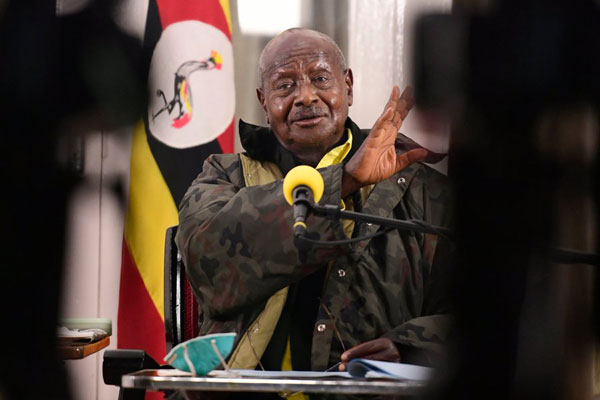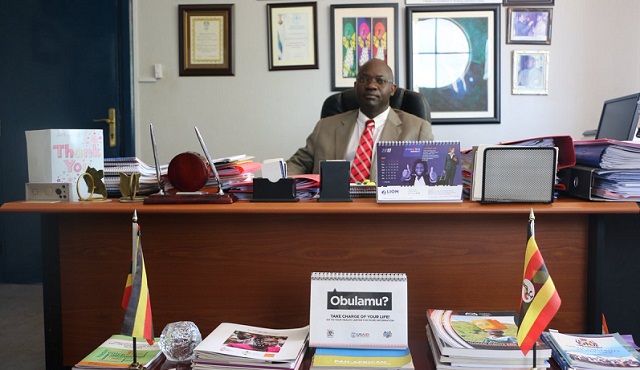
Museveni backs shooters
But, unlike in the past, Museveni this time did not say police should stop shooting.
Instead he said: “It is criminal to attack Security Forces by throwing stones or attempting to disarm them. In that scenario, the Police will legitimately fire directly at the attackers if they fail to respond to the firing in the air”.
He said the previous police responses were “weak” and listed a series of what he says should happen if what he calls “highly trained security personnel” are in operation.
Museveni says on Nov. 29, 21, and 22, these highly trained security personnel wearing the uniform of the counter-terrorism Police, went out on patrols through the so called “no go areas” for law enforcement.
On the 20th, the patrol went to Makerere-Kivulu, North of the Kissekka Market. They were attacked with mitayimbwa by thugs. Two criminals were shot dead there, Museveni says. A 3rd one died later on account of injuries.
On the 21st, the patrols went to the Katwe area where thugs started throwing stones at the Security personnel and injured one of them. The attacker was promptly shot dead, Museveni says.
On the 22nd of November, the security personnel were patrolling the “No Go area” of Nakivubo. One thug started attacking them by throwing stones. He was shot dead, Museveni says.
“The weak Police responses in the past may have created that false impression,” Museveni says and adds: “The perpetrators have tested the consequences of playing with fire.”
Museveni says it is wrong for some groups to only condemn the Security Forces, but never condemn law-breakers that attack innocent people, kill them, and rob them.
Museveni’s message appears to place political protest in the same box as criminality. He says some of the political actors, working with anti-Ugandan elements from outside, have been promoting impunity and swearing that they will render Uganda ungovernable. “We have been monitoring them through intelligence,” he says.
According to him, some political actors work with criminal gangs whom they pay money and give drugs and take advantage of serious weaknesses in the Police to declare some areas of Kampala as “No Go areas” for law enforcement. He calls these “conspirators”.
“They have been saying that they will burn the petrol stations etc,” he says.

According to Museveni, when Kyagulanyi and the FDC presidential candidate, Patrick Oboi Amuriat were arrested on Nov.18, “those criminal gangs, sponsored by political opportunists and backed by some external elements, decided to execute their long-planned scheme”.
He says they started burning tyres on the roads, mounting illegal roadblocks, robbing Ugandans, beating People, attacking people with NRM uniforms, stoning cars, stoning security personnel, and damaging government cars.
Museveni blames “weaknesses of the Police that allow such impunity of lawlessness to persist in our towns” and that a multi-force response was immediately activated. He does not mention genuine political protest against the arrest of politicians, which is guaranteed under the law.
Avoid bloodshed
Commenting on the events that Museveni speaks about, the Executive Director for Foundation for Human Rights Initiative, Livingstone Sewanyana, says the police and security agents should avoid bloodshed.
Sewanyana says: “Stop the senseless killings. Ugandans deserve better. Avoid bias and use of excessive force. Those who are committing abuses against the population must face the law”.

Sewanyana also pokes holes in a recent initiative by police boss, Okoth Ochola to hand out manuals with guidelines to officers saying it was all in vain, as the police officers he superintends have been doing the exact opposite of what the guidelines recommend.
Sewanyana says Ochola needs to initiate administrative mechanisms investigate allegations of violations of human rights by the police promptly, thoroughly and effectively through independent and impartial bodies. He says national human rights institutions, endowed with appropriate powers, can contribute to this end.
“A failure by a State Party to investigate allegations of violations could in and of itself give rise to a separate breach of the Covenant,” Sewanyana says.
Since Uganda voted to go multiparty politics, the Uganda Human Rights Commission has been publishing report after report ranking the Uganda Police Force among the top violators of human rights.
But the deafening silence from the Uganda police IGP and his deputy in the awake of police orchestrated political violence smacks of their leadership style –leading from the background.
After the recent protests, when religious leaders under their Inter-Religious Council in Uganda sought a meeting on Dec.02 with the police IGP over the electoral-related violence, they hoped to meet with Ochola. Instead Ochola delegated his juniors Asan Kasingye and Edward Ochom to meet the religious leaders.
But the silence of the top two police leader could also imply the dilemma they find themselves in –serving Ugandans or their appointing authority who is always complaining of the behavior of the police officers.
Right from 1996, President Yoweri Museveni is always suspicious of the police intentions. In the elections of 1996 and 2001 polling stations next to the police barracks have often voted against him.
On August 31, 2002, President Museveni expressed his displeasure with the police while speaking in Kitagata during the wedding reception of police cadet Muhabwe Labani.
“Even if a cow stood against me in a police barracks, it will get 100 votes and I get 10 votes. I always lost badly in their barracks,” he said, adding that he would recruit cadres to beat it back into line. The appointment of Gen Kayihura and Gen.Katumba Wamala before Ochola would, therefore, appear to have been part of the process of “sanitising the Force.”
The international reaction
But Ochola and Sabiiti are possibly concerned about how Kayihura ended after being praised by Museveni as “a good cadre”.
On August 23, 2016, less than two months after Gen. Kayihura was dragged to court for brutality, Museveni while addressing members of the Urban Authorities Association of Uganda (UAAU) lavished praise on him for a job well done.
“Kayihura has done a good job. He stopped fujo (chaos), because people wanted to bring fujo to disrupt business,” he said.
With such praises from the appointing authority, Kale Kayihura’s reign as the IGP, saw him “crush” political opposition activists including his policeman Gilbert Arinaitwe’s infamous smashing the car windows and pepper spraying of opposition stalwart Kizza Besigye. In such incidents of police violence Kayihura was rarely silent.
Kale knew the power of the limelight and he embraced it. He would often call impromptu press briefings and address them himself defending the actions of his officers.
When female political activists were being stripped naked by some arresting police officers, again Kayihura came out to defend the force. He was literally the face of the police force.
Even during the Buganda riots of 2009 where police and other security operatives shot over 20 people dead, Kayihura came out in the media –appearing on TV and radio talk shows explain the police and security side of the story.
In the 2011 walk-to-work protests led by Besigye, Kayihura was all over the media pushing the theory that the opposition wanted to overthrow Museveni’s government using the Egypt style of mass protests at Tahrir Square that saw the overthrow of Hosni Mubarak. In 2016, when the Uganda military smashed the Rwenzururu kingdom palace and massacred hundreds of civilians again Kayihura all over defending his men.
Even with Ochola who is a famed a career police officer, the police brutality as evidenced in the manner they handle protesters or rioters has not changed from the way it was during Kayihura’s reign.
But Ochola’s approach has been different. He rarely appears or speaks in public. He only issues missives when the appointing authority issues some concern. He reportedly prefers to address his police officers’ mistakes in the background. He has recently been issuing written orders and manuals. He also prefers to delegate.
Human rights lawyer Isaac Semakadde says, despite his avoidance of public scrutiny, legal accountability for violence by agents of security forces, especially the police, rests on IGP Okoth Ochola and his deputy, Sabiiti.
The international law puts command responsibility on the shoulders of superior commanders. Acts of violence and abuse of human rights by junior officers are blamed on the senior commander who is responsible for guiding foot soldiers. In light of this lawyers argue that the silence of current police top two commanders does not exonerate them from prosecution and criminal indictment.
“As leaders of the force, they have command responsibility of the actions of their officers. The state has a duty to refrain from acts that lead to loss of lives,” Semakadde says.
The United States has already condemned the election violence.
“The United States deplores the violence that has claimed multiple lives today, and we extend our sympathy to the victims’ families and loved ones,” said a Nov.19 statement from the new American ambassador to Uganda, Natalie Brown.
The statement added: “We urge all parties to renounce violence, undertake good-faith measures to reduce tensions, and respect fundamental freedoms.”
The Government of Uganda and its institutions have the responsibility to ensure the safety, security and dignified treatment of all citizens, including electoral candidates and their supporters, in line with national laws and Uganda’s international human rights commitments, it said.
It added: “A full and independent investigation should be launched into the events of 18th and 19th of November, to ensure justice for victims and to avoid impunity for the perpetrators who must be held accountable for their actions”. That is how the pressure mounts.
 The Independent Uganda: You get the Truth we Pay the Price
The Independent Uganda: You get the Truth we Pay the Price




Mr Isaac Semakadde, why are you loudly silent on the riot that happened recently in Uganda. In case Mr Isaac Semakadde is claiming ignorence about the riot, let me share a little with him about the same. The riot had goons that appeared to be well prior-prepared, organised, and with some command structure. The goons maimed, robbed, molested innocent people, tortured people because of their political affiliation and ethnicity, vandalised vehicles and ransacked shops, destroyed infrastructure including burning down a high court building in Wobulenzi, burned down government vehicles, destroyed tarmac by burning tyres, and caused general mayhem to Ugandans. One key incident that happened, is a video of a riot goon captured attacking a uniformed police lady with a hammer. Surprisingly, one of the presidential candidates has openly owned these thugs as his supporters, and even sent them messages of encouragement for a fight well fought. He and similarly his colleagues, have NEVER condemned these heinous acts against innocent Ugandans. Similarly, Ugandans are yet to hear the Semakaddes of this world condemning these goons for their devilish acts. Doesn’t it strike Semakadde and his think alikes that such a well organised, logistically facilitated, and commanded outfit that caused mayhem to Ugandans needs to be investigated? Or is Semakadde yet another agent lining up in the queue for a blood-stained cheque from the enemies of Uganda?